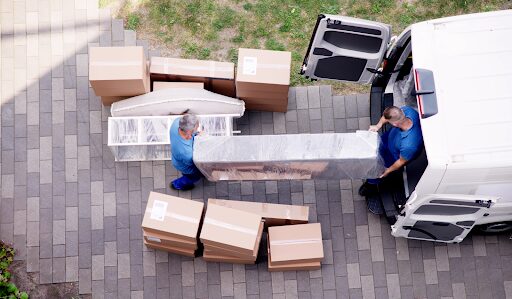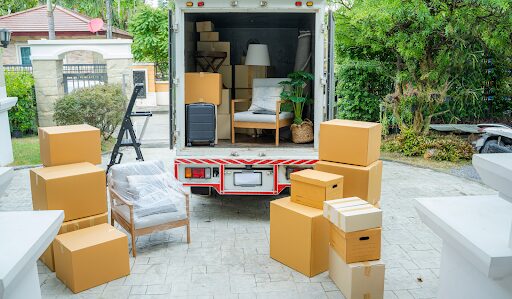Moving into a new house involves more than loading boxes and booking a truck. The real cost of relocation includes labor, fuel, insurance, deposits, supplies, and even short-term housing. These expenses add up quickly, especially if you are moving across state lines or navigating a tight timeline. Working with experienced removalists can ease the pressure and make the moving home process far more manageable, particularly when coordinated through trusted companies like homemove.com.au.
Whether you are renting your next place or buying your first home, budgeting accurately means looking beyond the price of movers. You will need to consider every step, from utility setup to cleaning fees, and prepare for unexpected costs like elevator access, overnight storage, or furniture replacements. Understanding the full picture helps you plan smarter, spend wisely, and arrive in your new home with fewer surprises.
How Much Does It Cost to Hire a Removalist?

If you want to avoid the stress and physical strain of moving, hiring a removalist is one of the smartest decisions you can make. The cost of professional help depends on several key factors, including the size of your home, the distance between properties, the number of movers required, and any additional services like packing or storage. For local moves, removalists typically charge by the hour. Rates range from 100 to 150 per hour for a team of two movers and a truck. Most small moves take between four and six hours, which puts the total between 400 and 900 on average.
For long-distance moves or more complex jobs, removalists may offer flat-rate pricing. A full-service move for a three-bedroom home over a longer distance can cost between 3,000 and 8,000 depending on the volume of items and whether services like furniture disassembly, unpacking, or temporary storage are needed. The more access issues or specialty items involved, the higher the price will be.
Additional removalist costs may include:
- Packing and unpacking services, usually charged separately
- Protective materials like shrink wrap, moving blankets, or mattress covers
- Extra charges for stairs, elevators, or long carries from truck to door
- Insurance upgrades for high-value items
- Storage fees if you need to delay delivery
Always ask for a detailed quote that outlines all services and fees so you can compare providers fairly. Booking early, especially during peak moving periods, can help secure a better rate and more availability. If your move date is flexible, try scheduling on a weekday or mid-month to save money.
Average Cost of Moving Locally vs Long-Distance
Local moves typically cost between 500 and 2,500 depending on how large your home is and how long it takes to load and unload everything. Moving companies often charge by the hour, with two movers and a truck starting at about 100 to 150 per hour. If you live in an apartment or smaller home, your costs will likely stay on the lower end. Larger homes with multiple bedrooms require more time and labor.
For long-distance moves, prices are calculated by weight, distance, and service level. The average cost of a cross-country move falls between 2,000 and 8,000 or more. If you are moving from one coast to another, shipping delays, fuel charges, and overnight storage can increase the total. Requesting an in-home estimate helps avoid unexpected costs and gives you a more accurate quote based on your actual belongings.
Key Factors That Influence Total Moving Costs

The cost of moving is shaped by several core factors. Understanding these in advance gives you more control when budgeting or comparing quotes.
- Distance between homes
- Volume and weight of items
- Size of moving crew required
- Type of items being moved, such as pianos or antiques
- Day and time of your move
- Whether your building has stairs, elevators, or tight hallways
- Fuel prices and road conditions
Summer is the busiest season for movers. Rates are typically higher from May through August. Weekends and end-of-month dates are also peak times. Booking early and moving midweek can help reduce your overall cost.
Additional Expenses Often Overlooked
Even with a quote from a mover, there are smaller expenses that tend to slip through the cracks. These extras can easily add several hundred dollars to your move if not accounted for.
- Packing supplies such as boxes, tape, labels, and bubble wrap
- Utility connection or disconnection fees
- Cleaning costs for your old home
- Temporary pet boarding or child care during the move
- Parking permits for moving trucks in urban areas
- Damage repair fees if you scratch floors or walls
- Tipping movers or providing refreshments for longer jobs
Taking time to itemise these ahead of your move gives you a more realistic cost estimate and prevents unnecessary stress.
Cost of Moving With Professional Movers vs DIY
Hiring professional movers saves time and effort but costs more than moving on your own. If you want someone to pack, load, transport, and unload everything, full-service movers offer convenience and speed. Rates are higher, but you will not need to lift a finger. On average, expect to pay anywhere from 1,000 to 5,000 for local moves and even more for long-distance.
A do-it-yourself move can cost significantly less. Renting a truck from a company like U-Haul, Budget, or Penske may range from 50 to 200 per day, depending on truck size and travel distance. You will also need to cover fuel, tolls, and labor. If friends or family are helping, offer a meal or thank-you gift. DIY is ideal for local moves or people with minimal furniture, but the physical labor and logistics can be challenging.
Storage, Temporary Housing, and In-Between Costs
Sometimes the timing does not align perfectly between your move-out date and move-in availability. When that happens, you may need to plan for short-term expenses.
- Monthly storage unit fees ranging from 50 to 300 depending on size and climate control
- Temporary accommodations such as hotels or short-term rentals
- Extra meals out if you do not have kitchen access
- Laundry services if your temporary space lacks appliances
- Double utility payments if services overlap between homes
Planning for these costs in advance helps reduce stress during your transition and ensures your budget stays realistic.
How to Budget and Plan Ahead for a Smooth Move

Creating a moving budget starts with collecting quotes from at least three moving companies. Be specific about your inventory, timing, and access points. Ask about hidden fees such as fuel surcharges or long carry charges. Request a written estimate and confirm whether it is binding or non-binding.
Once you know your base cost, add estimates for packing materials, tips, storage, and utility transfers. Give yourself a buffer of at least ten percent for unplanned expenses. Use a checklist app or spreadsheet to stay on track with tasks and deadlines. If your employer offers relocation assistance, ask what is reimbursable. Planning ahead turns a potentially stressful process into a manageable project.
When to Hire Professionals and When to DIY
Hire professional movers if you are short on time, have heavy or fragile items, or need to move long distance. They can handle logistics, reduce the risk of injury, and often offer insurance protection. This is a better option for families, older adults, or anyone juggling a busy schedule.
DIY works best for short moves, minimal furniture, and people who want to control every detail. Renting a truck and asking friends for help can save money, especially if your move is flexible. Just make sure to account for your own time, fuel, and physical effort. The right choice depends on your budget, timeline, and capacity.
Final Tips to Minimise Your Moving Expenses
Small decisions before and during your move can help you cut costs significantly.
- Declutter by donating or selling items you no longer need
- Use recycled boxes or ask local stores for free packing materials
- Pack strategically to reduce the number of trips or truck size required
- Move during off-peak seasons or weekdays to get better rates
- Cancel or transfer utilities early to avoid paying for unused days
- Keep all receipts if your move is work-related or partially reimbursed
The more organised and informed you are, the less likely you are to overspend.
How Much Should You Tip Movers?
While tipping is not mandatory, it is customary to reward movers for hard work and professionalism. For local moves, tipping 20 to 40 per mover is common. For long-distance moves, tips of 50 to 100 per mover are appropriate, especially if the crew handles packing or stairs.
Cash is appreciated, but you can also ask the company if tips can be added to your final bill. Offering water, snacks, or lunch is a thoughtful gesture, especially during long or hot moving days.
Tax Deductible Moving Expenses: What Still Applies?
Most taxpayers can no longer deduct moving expenses unless they are active-duty military relocating due to a permanent change of station. This change came with the 2018 Tax Cuts and Jobs Act and remains in effect through at least 2025.
If you qualify under the military exception, eligible deductions include transportation, lodging during the move, and storage for up to 30 days. Always consult a tax advisor and keep documentation for all related expenses.
What Insurance Do You Need When Moving?
Basic moving coverage is limited and may not fully protect your belongings. Standard coverage often reimburses based on weight rather than value, which means you might receive only a few dollars for expensive electronics or furniture.
You can purchase full-value protection through the moving company or buy separate moving insurance from a third-party provider. If you already have homeowners or renters insurance, check whether it includes coverage during transit. Understanding your insurance options helps protect your belongings and peace of mind.
What to Do Next to Prepare for a Successful Move
Now that you understand the full scope of relocation expenses, the most important step is to start early. Gather written estimates from reliable moving companies, build a realistic budget that covers both essential and hidden costs, and map out a timeline for packing, utility transfers, and property handovers. Organise your inventory and label your boxes clearly to save time during the move.
Take action on decisions that reduce stress. Confirm your move date in advance, choose your service providers carefully, and remove anything you no longer want to bring. If you are moving into a home you now own, make time to prepare for expenses like lawn tools, minor repairs, or neighborhood fees. A carefully planned approach makes the experience more efficient, less expensive, and easier to manage from beginning to end.





























